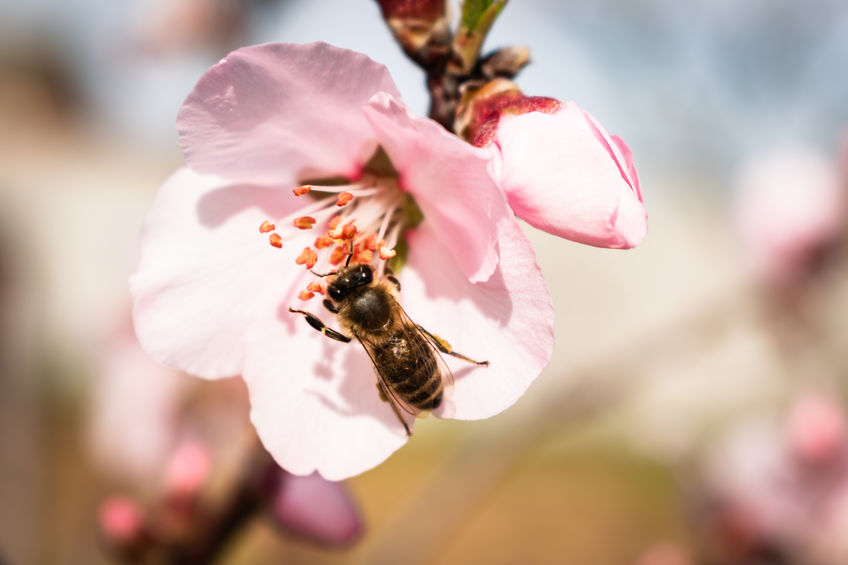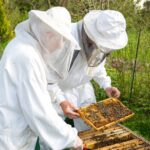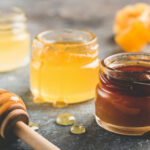
For generations, beekeeping in the United States was synonymous with honey production. Beekeepers made a living primarily by harvesting and selling honey, a valuable natural sweetener that found its way into homes and businesses across the country. However, in recent decades, the focus of the U.S. beekeeping industry has shifted dramatically. Today, pollination services—not honey—are now the primary source of income for many commercial beekeepers.
The Rise of Pollination Services
Honey used to be the bread and butter for beekeepers, but that all started to shift in the early 2000s. What caused the change? A massive surge in demand for pollination, particularly from California’s booming almond industry.
According to the USDA’s Economic Research Service, pollination services now bring in more income than honey sales for U.S. beekeepers and almonds are a big reason why. California produces over 80% of the world’s almonds, and every year, almond growers need two-thirds of the nation’s commercial honeybee colonies to get the job done.
Beekeepers on the Move
Most commercial beekeepers today are migratory. They travel with their hives to follow the bloom seasons across the country. It often starts in California for almond pollination in February, then moves to Washington for apples, the Midwest for clover and sunflowers, and sometimes up to Maine for blueberries.
The USDA outlines these migratory routes as critical to U.S. agriculture. It’s not just almonds—crops like apples, cherries, cranberries, and melons also rely on traveling bee colonies.
Why the Big Shift?
So why did pollination services take over honey production? A few key reasons:
- Better Pay: Pollination contracts, especially for almonds, offer more stable and higher income than honey alone.
- Imported Honey Competition: Imported honey has flooded the market, making it harder for domestic honey producers to compete on price.
- Farming’s Growing Dependence: Modern farming relies heavily on managed honeybee colonies for crop pollination.
- Environmental Challenges: Factors like drought, habitat loss, and unpredictable weather have made honey yields less reliable year to year.
The Life of a Modern Beekeeper
Beekeepers today wear many hats. They’re logistics experts, moving hives thousands of miles across the country each year to meet seasonal bloom cycles. Planning these routes requires precision and knowledge of regional climates, crop schedules, and regulatory requirements.
They’re also colony managers, constantly battling threats like Varroa mites and pesticide exposure during crop pollination. This means that managing hive health has become more labor-intensive and costly, with an increased focus on nutrition and veterinary care for bee colonies.
In addition, modern beekeepers must juggle business relationships with growers, negotiate contracts, and ensure their hives meet performance expectations. Many also diversify income streams by still producing and marketing specialty honey or selling beeswax and other hive products.
Evolving Pollination Contracts: The New Normal
As the demand for pollination services grows, beekeepers and growers alike are rethinking how they collaborate. According to University of Illinois research, more growers and beekeepers are entering into detailed contracts to ensure hive quality and adequate bee populations.
These new agreements often include clauses focusing on hive health, colony size, and pest management standards to protect pollinators and crops. With rising concerns about pollinator health and agricultural sustainability, this shift toward formalized contracts helps stabilize relationships between beekeepers and farmers and ensures better outcomes for both.
The Future of Beekeeping and How Honey Source Supports the Industry
Beekeeping in the U.S. has evolved from its honey-centric roots into a pollination-first business. While honey is still an essential part of the industry, pollination services now drive much of what modern beekeepers do. As growers and food producers continue to depend on these critical services, beekeepers play a key role in sustaining agriculture and ecosystems.
At Honey Source, we proudly support beekeepers and the wider food industry by providing high-quality, sustainably sourced honey for food and beverage manufacturers, chefs, and businesses nationwide. Whether you’re looking for bulk honey or seeking to learn more about the honey supply chain, we’re here to help!
Contact us today for a quote or to learn how we can support your business with premium honey products.





